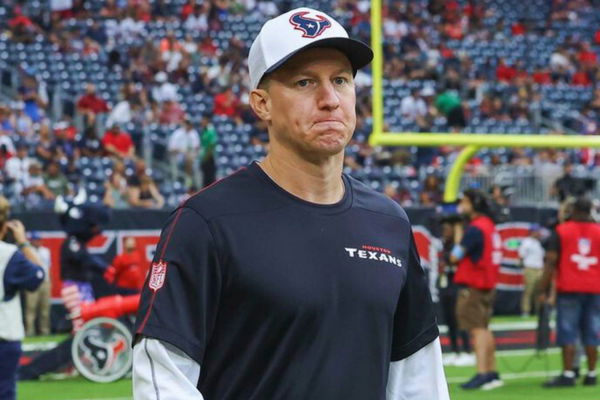

What started as a project, and a good one—the whole squad bought in. Front office relaxed. However, it didn’t take much for Houston to hit Bobby Slowik‘s pipe dream with a ‘problem’. By the end of 2024, the offense had turned into a train wreck. And the players? They weren’t exactly giving him a standing ovation on the way out.
One star player put it bluntly to ESPN: “I don’t think we had a true identity of what the f— we wanted to do.” That’s not just frustration—it’s a full-blown indictment of Slowik’s leadership.
Meanwhile, the numbers don’t lie either. The Texans’ offense went from top-12 in 2023 to ranking 22nd in total yards, 21st in passing, and 19th in scoring this season. C.J. Stroud, fresh off an Offensive Rookie of the Year campaign, looked like he was constantly running for his life. The league defenses were on to him, sacking him 52 times, second-most in the league. That’s not just bad luck—that’s a broken system.
ADVERTISEMENT
Article continues below this ad
But it wasn’t supposed to be this way. The Texans added Stefon Diggs and Joe Mixon to a young, ascending offense. Yet, somehow, they got worse. Injuries played a role—Diggs tore his ACL, Tank Dell and Nico Collins missed time—but the game plan never adapted. Slowik kept dialing up the same predictable schemes, and defenses feasted. One team source didn’t mince words: “We had all season to make adjustments and improvements, and it never happened.”
DeMeco Ryans saw the writing on the wall. Two days after Houston’s playoff exit, he made it clear: the offense needed to improve. Four days later, Slowik and O-line coach Chris Strausser were out. Ryans called it “very hard” to watch his close friend getting axed, but when your own players lose faith, there’s no choice. If your scheme isn’t working, you either evolve or get left behind.
DeMeco asked the players before making the decision to fire Bobby Slowik as the Texans OC.
I love that he went to the players before making such a big decision. It may have seemed obvious, but he confirmed with his guys before pulling the trigger. pic.twitter.com/Xd0w22PaD0
— James Roy (@JamesRoyNFL) February 15, 2025
And that’s exactly what happened. Slowik’s inability to adjust turned the Texans from an exciting young team into a unit that had to rely on its defense to stay competitive. That’s a death sentence in today’s NFL. Sure, they squeaked by the Chargers in the Wild Card round, but by the time they met the Chiefs, the offense was a shadow of what it once was.
Now, with all this noise, one question lingers: Did Slowik fail Stroud, or was Stroud never set up to succeed in the first place?
What’s your perspective on:
Did Bobby Slowik's rigid schemes sabotage C.J. Stroud's potential, or was Stroud never the right fit?
Have an interesting take?
Did Bobby Slowik slow down C.J. Stroud?
Houston fans expected a sophomore leap from C.J. Stroud in 2024. Instead, they got a quarterback stuck in quicksand. So, the whole Sophomore Slump chatter? Yeah, it’s as real as you can imagine it to be. His completion percentage, passing yards, and touchdowns all dipped, while his interceptions more than doubled—from five to twelve. Some blame injuries. While others point to an inconsistent O-line. But there’s another argument: Bobby Slowik didn’t just fail Stroud—he held him back.

USA Today via Reuters
Nov 26, 2023; Houston, Texas, USA;Jacksonville Jaguars defensive end Roy Robertson-Harris (95) sacks Houston Texans quarterback C.J. Stroud (7) in the first quarter at NRG Stadium. Mandatory Credit: Thomas Shea-USA TODAY Sports
The play-calling? Predictable. Defenses caught on fast, and Slowik never countered. Stroud spent more time under siege than making plays. Those hits were brutal, and the worst part was that they kept on coming. Kansas City exposed this in the Divisional Round, blitzing him on 56% of his dropbacks, leading to eight sacks. Stroud said after one of the losses in the season: “There were times where I sit back there, and I’m thinking too much.” That hesitation? That’s a coaching failure.
ADVERTISEMENT
Article continues below this ad
It wasn’t just the protection or the game plan—it was how Stroud was being coached. Some in the building believed Slowik was forcing him into a system, rather than letting him do what made him special. Stroud isn’t a robotic pocket passer; he’s a playmaker. Instead of playing fast, he was over-processing. A team source even admitted, “I just feel like [the offensive coaches] were just putting a lot of pressure on him.”
Texans’ final quarter of the season summed it up. Chiefs defensive coordinator Steve Spagnuolo blitzed Stroud on ten of his last eighteen dropbacks, and Houston had zero points to show for it. So, just like that, Stroud was 3-of-8 for 41 yards, with two sacks and six unblocked pressures when blitzed. No adjustments. No counters. Just an overwhelmed QB trying to survive.
ADVERTISEMENT
Article continues below this ad
Meanwhile, this wasn’t just about growing pains. It was about a coaching philosophy that didn’t fit the quarterback. The Texans moved on from Slowik for a reason. Now, with a new OC on the way, Stroud has a chance to play his game again—the one that made him special in the first place—or play his way out of Houston.
ADVERTISEMENT
ADVERTISEMENT
ADVERTISEMENT
ADVERTISEMENT


Did Bobby Slowik's rigid schemes sabotage C.J. Stroud's potential, or was Stroud never the right fit?